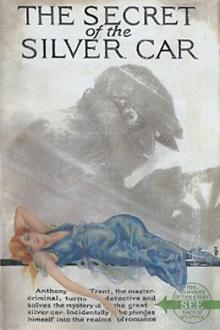The Secret of the Silver Car - Wyndham Martyn (red white royal blue txt) 📗

- Author: Wyndham Martyn
- Performer: -
Book online «The Secret of the Silver Car - Wyndham Martyn (red white royal blue txt) 📗». Author Wyndham Martyn
If by any chance the men did not see him and the car passed him on its seaward way his errand would be unaccomplished, his boasts vain and the humiliation of his friends certain. He had determined if this happened to send a telegram to the earl admitting defeat, and warning of the count’s visit.
The Panhard came to a grinding stop a foot from the barrier. Sissek removed it as quickly as he could but it was heavy enough to have taxed Anthony Trent’s superior strength and the count grew so impatient at the time taken that he sprang down to the road and urged his man to greater activities.
The two were jabbering in Croatian when Anthony Trent lowered himself to the top of the limousine and nestled down in the shadow of the baggage.
Trent had often been incensed in reading newspaper accounts of his exploits to find that their success was so often ascribed to mere luck. He supposed it would be so this time if it were known. People would say that owing to two boulders in the side of the road Sissek pulled up so that Trent could drop directly down on to the car. In most cases the greatest luck comes to the best player and Anthony Trent had placed the rocks on the road with the same care that he would play a stroke in golf or cast along the edge of lily pads where the big trout lay in graceful ease. There was only one place where Sissek could halt his machine.
It was while the car travelled along a poor and rough section of the route before reaching the Marie Louise road that Trent unstrapped a bundle and selected a dark travelling-rug to cover him from observant eyes in the infrequent towns through which they must pass.
Half a hundred schemes raced through his quick, fertile brain only to be rejected. He wondered, for instance, if it were possible to cut through the top of the car and get at the count who was certain to be sleeping a goodly portion of the journey. He decided that to lean over the rails and try to peer through the oval glass window in the rear would also be unwise. At most he would only catch a glimpse of the count and might just as easily be seen himself. Then he wondered if it might not be possible to drop down on Peter Sissek’s shoulders and strangle him into quietness.
But Peter Sissek was taking his car along at a steady rate of twenty-five miles the hour and with his hands off the steering wheel—a certain contingency if Trent’s strong fingers closed around his throat—a bad accident was inevitable. A precipice on one side and a wall of rock on the other, he would be between the deep sea and the devil.
He saw that Sissek must be eliminated at all costs. A match for either of them singly Trent would certainly be overpowered in a tussle with both; although they lacked the cat-like quickness of the American they were both of uncommon strength. The immediate problem was to get rid of Sissek and leave his master none the wiser.
There was a part of the road through which they must presently pass which promised aid to the schemer. It was a gentle rise through a very dense section of beech forest and Peter would go slowly fearing that the uneven surface would jolt his lord into unwelcome anger.
Peter Sissek, straining his eyes to see that his way
was clear, was startled when one of the pieces of baggage on the top of the car was jolted off. It fell on the Panhard’s bonnet and then bounded into the side of the road. He had run past it fifty yards before he brought his machine to a stop.
When he backed up to the fallen bag Count Michel was aroused from slumber and ascribed the accident to Peter’s carelessness. In the chauffeur’s apology Anthony Trent heard his assumed name brought in. Plainly Peter was making him the culprit. He had pitched the bundle from the roof with some skill. It bounded far into the shadow. Finally Peter Sissek stumbled over it. And as he stooped to retrieve it, Alfred Anthony swung at him. For the second time Peter had taken the count. To hit a defenceless, unsuspecting man was not a thing to give Trent any pleasure, but it was not a moment in which to hesitate. With Peter’s livery cap and duster on, Trent took the bundle on his shoulder and carried it at such an angle that in case of scrutiny his face would be shielded from gaze.
A quick backward glance a few minutes later on showed the new driver that the count had resumed his broken slumbers. So well indeed did the lord of Castle Radna sleep that he did not know the Panhard had left the main road or that any danger threatened him until he was suddenly hauled from his springy seat to look into the clear, hard eyes of Alfred Anthony.
Then he realized that his revolver was in the cockney’s hand and the precious wallet gone from his pocket. Count Michael was no coward and he thought quickly with that intriguing, plotting brain of his. A great diamond still sparkled upon his finger and the money in another pocket was untouched.
“I should have been wiser,” he commented. “I thought my lord Rosecarrel had become suddenly mad. Now I see that he was saner than I. First Captain the Honourable Oswald Hardcastle, then Sir Piers Edgcomb and now you. May I ask your name and rank? You have been my servant and succeeded so far where they failed?”
Anthony Trent was not expecting this attitude. He had been so used to seeing the count fly into stupendous rages that this calm, collected manner was disturbing. It might be the man’s natural attitude in moments of real peril or it might merely mean he knew he was ultimately to be the victor.
It was a curious scene. The Panhard had come to rest in a clearing of the woods and a brilliant moon gave the place almost the clarity of day.
Count Michael sat down on a log and lighted a cigarette. Almost he was usurping Trent’s role under such circumstances.
“This interests me,” said Count Michael, ‘let us discuss it.”
“I’ve no time,” Trent said smiling. “I am due at Fiume or Trieste or Zara as the case may be at a certain hour and as I haven’t the Lion here I must push on.”
“Have you thought that I shall certainly pursue you and assuredly capture you?”
“You may pursue later when you are found but by that time I shall be gone.”
“You can never escape me,” the count said, “I have a long arm and I do not forget. And my vengeance is a bad thing for those against whom it is directed.”
“It’s not altogether healthy to have me for an enemy,” Trent reminded him. “I have my own likes and dislikes.”
The count sneered.
“You,” he cried, “Who are you? What have you done that men should fear you? For a moment you have a little luck, the little luck that will bring you blindly to greater danger.”
“I’m strictly incognito,” Trent answered. “Once I was unwise enough to answer such a challenge, but you may believe me that I, too, have a name. Now count, it won’t help you a bit to put up a fight. It will save you trouble if you’ll back up against that tree and let me tie you up.”
“You would put this outrage on me?” the other cried, his calm leaving him, the veins standing out on an empurpled forehead like raised livid ridges.
“Get up!” Anthony Trent snapped.
“It is because you have a pistol,” the count said. “Put that down if you are a man and then see what you can make me do.”
“You may believe it or not,” Trent retorted, “but it hurts me to have to decline the offer. If I dared take time I would return several little tendernesses of yours. As it is I can’t, having a weapon, strike a man who hasn’t one. You are luckier than you know. Back up there and do it damned quick.”
Trent was certain that Count Temesvar could never unfasten his bonds. And as he was gagged he could not cry for help. Some swineherd or peasant would discover him later. Meanwhile the discipline would be good.
“Good-by,” said Trent genially, “Give my love to your guest the prince and all his high born companions.”
If Count Michael had looked angry before his face now was doubly hideous with rage. His hold over Lord Rosecarrel was gone and he could not doubt but this stranger who had posed as a chauffeur had learned somehow of the presence of the prince. If it were known in the chancelleries of Europe all his carefully matured plans would go for naught. Unless Alfred Anthony were captured Michael, Count Temesvar could never again make his pleasant little trips to the great houses of England, France and Italy. There he was known as one who had abandoned all political ambitions to become merely the country magnate interested hi cattle and crops. Never again could he gather useful information over friendly dinner tables or hobnob with prime ministers over golf or auction bridge if it were known he was giving sanctuary to one who threatened the world peace.
When Anthony Trent had satisfied himself that the document he had taken was the one Arthur stole from his father, he knew, in order to be absolutely safe, it should be destroyed. Its destruction would give the earl immunity. But Trent hesitated. Once already Lord Rosecarrel had believed it was demolished and had suffered terribly for his trust. Inevitably there would be a seed of suspicion if a comparative stranger, confessedly one who had profited by unlawful operations, should ask him to take as true that the treaty had again been destroyed.
A man in Trent’s position was doubly sensitive in a matter of this sort. He had no long and honorable record to back his assertions; and although in the present instance he was actuated by no motives of self-aggrandizement he was not sure others—Daphne alone excepted—would believe him. He thanked God that with her it was different.
So he put the paper in an envelope already stamped and addressed and placed it in his pocket. Then he started for a port of safety.
It seemed impossible that he should miss the way in the bright moonlight but he realized a few minutes later that he was only circling around the clearing where the count was tied to a tree. His headlights showed him innumerable roads like those by which he had come but there was no distinctive sign to guide him to the road to the coast. A group of peasants going incredibly early to their work could not understand him. He repeated the word Fiume but even that did not help. Their little life was bounded by the confines of a few square miles; and the troop trains which had taken them to the battle lines of a year or so back had only confused them as to topography.
Among the big oaks and beeches Trent could not easily find one tall enough to bear his weight on branches that would let him see over the





Comments (0)